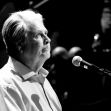D’Angelo, the singer, songwriter, and producer whose small but extraordinary body of work reshaped the sound and scope of modern soul music, has died at 51. His family confirmed that the artist, born Michael Eugene Archer, passed away on October 14 following a long battle with cancer.
In a statement, his relatives wrote that “the shining star of our family has dimmed his light for us in this life,” and expressed gratitude for “the legacy of extraordinarily moving music he leaves behind.”
D’Angelo’s influence on R&B and popular music far exceeds the three albums he released across thirty years. His debut, Brown Sugar (1995), arrived when he was just 21 and quickly established him as one of the defining new voices in American music. Fusing gospel harmony, jazz phrasing, and hip-hop rhythm, the record was both a commercial success and a creative turning point, marking the beginning of what critics came to call “neo-soul,” a term D’Angelo himself would later reject.
“I never claimed that,” he said in 2014. “I make Black music. That’s what I do.”
His 2000 follow-up, Voodoo, recorded with Questlove and the Soulquarians collective at Electric Lady Studios, deepened that philosophy. The album’s loose, analog production, raw instrumentation, and shifting time signatures pushed R&B into uncharted territory. It debuted at Number One on the Billboard 200 and won two Grammys, including Best R&B Album.
The record’s most enduring moment, “Untitled (How Does It Feel),” became both a cultural milestone and a burden. The video, a single, intimate shot of D’Angelo performing the song redefined male sensuality in R&B, but also complicated his relationship with fame. As he later told Rolling Stone, he struggled with being objectified, fearing that the focus on his image had obscured the seriousness of his work.
Following Voodoo, D’Angelo largely withdrew from public life. Over the next decade, he battled addiction, legal issues, and prolonged creative paralysis. Collaborators described him as a perfectionist unwilling to release music until it met his exacting standards.
When he returned in late 2014 with Black Messiah, the surprise release felt less like a comeback than a reemergence. The album that is politically charged, musically intricate, and emotionally raw was released earlier than planned in response to protests over police violence in Ferguson, Missouri. D’Angelo described the urgency behind the project simply: “I had to contribute. I had to participate.”
The record was met with widespread acclaim, earning him two more Grammys and reaffirming his reputation as one of the most uncompromising artists of his generation.
Born in Richmond, Virginia, on February 11, 1974, D’Angelo grew up surrounded by the church music that would later shape his sound. His father and grandfather were Pentecostal ministers, and by age three he was already playing piano. He won multiple talent shows as a teenager and famously competed at Harlem’s Apollo Theater, first losing, then returning a year later to win.
He broke into the industry in the early 1990s, co-writing “U Will Know” for the all-star R&B collective Black Men United before signing his own record deal. Brown Sugar followed soon after, with D’Angelo writing and performing most of the album himself at his mother’s home studio.
In later years, D’Angelo performed selectively and recorded sporadically, but his influence never faded. His harmonic approach and rhythmic phrasing left a deep imprint on contemporary artists from Frank Ocean to H.E.R. to Anderson .Paak. Raphael Saadiq, his longtime collaborator, recently said D’Angelo had been “in a good space” and working on new material.
D’Angelo’s death closes a career defined not by quantity but by precision. His work existed at the intersection of spirituality and sensuality, always in pursuit of truth rather than trend. As Bob Power, who engineered Brown Sugar, once said, “There are very few times when a true innovator appears, Marvin, Prince, Joni, and D’Angelo.”
With his passing, popular music loses one of its most disciplined and quietly radical figures, an artist whose devotion to sound, timing, and emotion redrew the boundaries of soul.






